
BỘ GIÁO DỤC VÀ ĐÀO TẠO
ĐỀ CHÍNH THỨC
(Đề thi có 07 trang)
ĐỀ THI TUYỂN SINH ĐẠI HỌC NĂM 2011
Môn: TIẾNG ANH; Khối D
Thời gian làm bài: 90 phút, không kể thời gian phát đề
Mã đề thi 284
Họ, tên thí sinh: ..........................................................................
Số báo danh: ............................................................................
ĐỀ THI GỒM 80 CÂU (TỪ QUESTION 1 ĐẾN QUESTION 80)
Mark the letter A, B, C, or D on your answer sheet to indicate the word that differs from the rest in
the position of the main stress in each of the following questions.
Question 1: A. represent B. permanent C. continent D. sentiment
Question 2: A. immediate B. optimist C. accuracy D. fabulous
Question 3: A. participate B. hydrology C. facilitate D. intimacy
Question 4: A. romantic B. financial C. popular D. reduction
Question 5: A. involve B. guidance C. future D. prospect
Mark the letter A, B, C, or D on your answer sheet to indicate the word or phrase that is
OPPOSITE in meaning to the underlined part in each of the following questions.
Question 6: Fruit and vegetables grew in abundance on the island. The islanders even exported the
surplus.
A. excess B. large quantity C. small quantity D. sufficiency
Question 7: There is growing concern about the way man has destroyed the environment.
A. attraction B. consideration C. ease D. speculation
Read the following passage adapted from Understanding Rural America - InfoUSA and mark the
letter A, B, C, or D on your answer sheet to indicate the correct word for each of the blanks from 8
to 17.
The well-being of America's rural people and places depends upon many things - the availability
of good-paying jobs; (8)______ to critical services such as education, health care, and
communication; strong communities; and a healthy natural environment. And, (9)______ urban
America is equally dependent upon these things, the challenges to well-being look very different in
rural areas than in urban areas. Small-scale, low-density settlement (10)______ make it more costly
for communities and businesses to provide critical services. Declining jobs and income in the natural
resource-based industries that many rural areas depend on (11)______ workers in those industries to
find new ways to make a living. Low-skill, low-wage rural manufacturing industries must find new
ways to challenge the increasing number of (12)______ competitors. Distance and remoteness
impede many rural areas from being connected to the urban centers of economic activity. Finally,
changes in the availability and use of natural resources located in rural areas (13)______ the people
who earn a living from those resources and those who (14)______ recreational and other benefits
from them.
Some rural areas have met these challenges successfully, achieved some level of prosperity, and
are ready (15)______ the challenges of the future. Others have neither met the current challenges nor
positioned themselves for the future. Thus, concern for rural America is real. And, while rural
America is a producer of critical goods and services, the (16)______ goes beyond economics. Rural
America is also home to a fifth of the Nation's people, keeper of natural amenities and national
treasures, and safeguard of a/an (17)______ part of American culture, tradition, and history.
Question 8: A. key B. access C. challenge D. advantage
Question 9: A. while B. when C. because D. since
Question 10: A. means B. patterns C. tools D. styles
Question 11: A. offer B. force C. turn D. make
Question 12: A. abroad B. lateral C. rural D. foreign
Trang 1/7 - Mã đề thi 284

Question 13: A. encourage B. affect C. stimulate D. effect
Question 14: A. derive B. evolve C. bring D. involve
Question 15: A. with B. in C. for D. of
Question 16: A. concern B. stimulus C. research D. impatience
Question 17: A. incredible B. simple C. unique D. abnormal
Mark the letter A, B, C, or D on your answer sheet to indicate the word or phrase that is closest in
meaning to the underlined part in each of the following questions.
Question 18: His new work has enjoyed a very good review from critics and readers.
A. opinion B. viewing C. look D. regard
Question 19: We have lived there for years and grown fond of the surroundings. That is why we do
not want to leave.
A. loved the surroundings B. possessed by the surroundings
C. haunted by the surroundings D. planted many trees in the surroundings
Question 20: Such problems as haste and inexperience are a universal feature of youth.
A. separated B. marked C. hidden D. shared
Mark the letter A, B, C, or D on your answer sheet to show the underlined part that needs
correction in each of the following questions.
Question 21: Hardly did he enter the room when all the lights went out.
A B C D
Question 22: Publishing in the UK, the book has won a number of awards in recent regional book fairs.
A B C D
Question 23: The first important requirements for you to become a mountain climber are your
A B C
strong passion and you have good health.
D
Question 24: A professor of economy and history at our university developed a new theory of
A B
the relationship between historical events and financial crises.
C D
Question 25: During our tour of the refinery, it was seen that both propane and gasoline
A B C
were produced in large volumes.
D
Read the following passage adapted from Cultural Guide - OALD, and mark the letter A, B, C, or D
on your answer sheet to indicate the correct answer to each of the questions from 26 to 35.
The issue of equality for women in British society first attracted national attention in the early 20th
century, when the suffragettes won for women the right to vote. In the 1960s feminism became the
subject of intense debate when the women’s liberation movement encouraged women to reject their
traditional supporting role and to demand equal status and equal rights with men in areas such as
employment and pay.
Since then, the gender gap between the sexes has been reduced. The Equal Pay Act of 1970, for
instance, made it illegal for women to be paid less than men for doing the same work, and in 1975 the
Sex Discrimination Act aimed to prevent either sex having an unfair advantage when applying for
jobs. In the same year the Equal Opportunities Commission was set up to help people claim their
rights to equal treatment and to publish research and statistics to show where improvements in
opportunities for women need to be made. Women now have much better employment opportunities,
though they still tend to get less well-paid jobs than men, and very few are appointed to top jobs in
industry.
In the US the movement that is often called the “first wave of feminism” began in the mid 1800s.
Susan B. Anthony worked for the right to vote, Margaret Sanger wanted to provide women with the
means of contraception so that they could decide whether or not to have children, and Elizabeth
Trang 2/7 - Mã đề thi 284

Blackwell, who had to fight for the chance to become a doctor, wanted women to have greater
opportunities to study. Many feminists were interested in other social issues.
The second wave of feminism began in the 1960s. Women like Betty Friedan and Gloria Steinem
became associated with the fight to get equal rights and opportunities for women under the law. An
important issue was the Equal Rights Amendment (ERA), which was intended to change the
Constitution. Although the ERA was not passed, there was progress in other areas. It became illegal
for employers, schools, clubs, etc. to discriminate against women. But women still find it hard to
advance beyond a certain point in their careers, the so-called glass ceiling that prevents them from
having high-level jobs. Many women also face the problem of the second shift, i.e. the household
chores.
In the 1980s, feminism became less popular in the US and there was less interest in solving the
remaining problems, such as the fact that most women still earn much less than men. Although there
is still discrimination, the principle that it should not exist is widely accepted.
Question 26: It can be inferred from paragraph 1 that in the 19th century, ______.
A. suffragettes fought for the equal employment and equal pay
B. British women did not have the right to vote in political elections
C. British women did not complete their traditional supporting role
D. most women did not wish to have equal status and equal rights
Question 27: The phrase “gender gap” in paragraph 2 refers to ______.
A. the visible space between men and women
B. the social distance between the two sexes
C. the social relationship between the two sexes
D. the difference in status between men and women
Question 28: Susan B. Anthony, Margaret Sanger, and Elizabeth Blackwell are mentioned as
______.
A. American women who were more successful than men
B. American women with exceptional abilities
C. American women who had greater opportunities
D. pioneers in the fight for American women’s rights
Question 29: The Equal Rights Amendment (ERA) ______.
A. supported employers, schools and clubs B. was not officially approved
C. was brought into force in the 1960s D. changed the US Constitution
Question 30: In the late 20th century, some information about feminism in Britain was issued by
______.
A. the Equal Opportunities Commission B. the Sex Discrimination Act
C. the Equal Pay Act of 1970 D. the Equal Rights Amendment
Question 31: Which of the following is true according to the passage?
A. The movement of feminism began in the US earlier than in Britain.
B. The women’s liberation movement in the world first began in Britain.
C. The British government passed laws to support women in the early 20th century.
D. The US movement of feminism became the most popular in the late 20th century.
Question 32: The phrase “glass ceiling” in paragraph 4 mostly means ______.
A. an overlooked problem B. a transparent frame
C. an imaginary barrier D. a ceiling made of glass
Question 33: Which of the following is NOT mentioned in the passage?
A. There is now no sex discrimination in Britain and in the US.
B. British women now have much better employment opportunities.
C. Many American women still face the problem of household chores.
D. An American woman once had to fight for the chance to become a doctor.
Question 34: It can be inferred from the passage that ______.
A. women do not have better employment opportunities despite their great efforts
B. the belief that sex discrimination should not exist is not popular in the US
Trang 3/7 - Mã đề thi 284

C. the British government did not approve of the women’s liberation movement
D. women in Britain and the US still fight for their equal status and equal rights
Question 35: Which of the following would be the best title for the passage?
A. The Suffragettes in British Society B. Women and the Right to Vote
C. Feminism in Britain and the US D. Opportunities for Women Nowadays
Mark the letter A, B, C, or D on your answer sheet to indicate the sentence that is closest in
meaning to each of the following questions.
Question 36: “You shouldn’t have leaked our confidential report to the press, Frank!” said Jane.
A. Jane suspected that Frank had leaked their confidential report to the press.
B. Jane criticized Frank for having disclosed their confidential report to the press.
C. Jane accused Frank of having cheated the press with their confidential report.
D. Jane blamed Frank for having flattered the press with their confidential report.
Question 37: “Don’t forget to tidy up the final draft before submission,” the team leader told us.
A. The team leader ordered us to tidy up the final draft before submission.
B. The team leader reminded us to tidy up the final draft before submission.
C. The team leader asked us to tidy up the final draft before submission.
D. The team leader simply wanted us to tidy up the final draft before submission.
Question 38: “My company makes a large profit every year. Why don’t you invest more money in
it?” my friend said to me.
A. My friend instructed me how to put more money into his company.
B. My friend persuaded me to invest more money in his company.
C. I was asked to invest more money in my friend’s company.
D. My friend suggested his investing more money in his company.
Question 39: “Mum, please don’t tell dad about my mistake,” the boy said.
A. The boy begged his mother not to tell his father about his mistake.
B. The mother was forced to keep her son’s mistake as a secret when he insisted.
C. The boy earnestly insisted that his mother tell his father about his mistake.
D. The boy requested his mother not to talk about his mistake any more.
Question 40: “If you don’t pay the ransom, we’ll kill your boy,” the kidnappers told us.
A. The kidnappers ordered to kill our boy if we did not pay the ransom.
B. The kidnappers pledged to kill our boy if we did not pay the ransom.
C. The kidnappers threatened to kill our boy if we refused to pay the ransom.
D. The kidnappers promised to kill our boy if we refused to pay the ransom.
Mark the letter A, B, C, or D on your answer sheet to indicate the correct answer to each of the
following questions.
Question 41: Our boss would rather ______ during the working hours.
A. us not chat B. we didn’t chat C. we don’t chat D. us not chatting
Question 42: The sky was cloudy and foggy. We went to the beach, ______.
A. so B. yet C. however D. even though
Question 43: Alfonso: “I had a really good time. Thanks for the lovely evening.”
Maria: “______.”
A. No, it’s very kind of you B. Oh, that’s right
C. I’m glad you enjoyed it D. Yes, it’s really good
Question 44: The instructor blew his whistle and ______.
A. off were running the runners B. the runners run off
C. off ran the runners D. off the runners were running
Question 45: The sign “NO TRESPASSING” tells you ______.
A. not to smoke B. not to photograph C. not to approach D. not to enter
Question 46: He never lets anything ______ him and his weekend fishing trip.
A. come between B. come up C. come among D. come on
Trang 4/7 - Mã đề thi 284

Question 47: “We'd better ______ if we want to get there in time.”
A. put down B. speed up C. turn down D. take up
Question 48: Harry: “Are you ready, Kate? There’s not much time left.”
Kate: “Yes, just a minute. ______!”
A. I won’t finish B. I’m coming C. I’d be OK D. No longer
Question 49: “You’ll recognize Jenny when you see her. She ______ a red hat.”
A. will wear B. is wearing C. will be wearing D. wears
Question 50: Sue: “Can you help me with my essay?”
Robert: “______”
A. Not completely. B. Yes, I’m afraid not. C. Why not? D. I think that, too.
Question 51: I did not want to believe them, but in fact, ______ was true.
A. what they said B. that they were said C. what has said D. which they said
Question 52: The village was ______ visible through the dense fog.
A. hard B. mostly C. only D. barely
Question 53: The Second World War ______ in 1939.
A. took out B. turned up C. broke out D. brought about
Question 54: “______ you treat him, he’ll help you. He’s so tolerant.”
A. Even though B. As if C. In addition to D. No matter how
Question 55: This shirt is ______ that one.
A. a bit less expensive B. much far expensive than
C. not nearly as expensive as D. as much expensive as
Question 56: If it ______ for the heavy storm, the accident would not have happened.
A. weren’t B. isn’t C. were D. hadn’t been
Question 57: The temperature ______ takes place varies widely from material to material.
A. which they melt B. at which melting C. which melting D. at which they melt
Question 58: “You ______ have cooked so many dishes. There are only three of us for lunch.”
A. needn’t B. couldn’t C. wouldn’t D. oughtn’t
Question 59: “Never be late for an interview, ______ you can’t get the job.”
A. or so B. unless C. if not D. otherwise
Question 60: I could not ______ the lecture at all. It was too difficult for me.
A. hold on B. make off C. get along D. take in
Question 61: She built a high wall round her garden ______.
A. in order that her fruit not be stolen B. so that her fruit would be stolen
C. to enable people not taking her fruit D. to prevent her fruit from being stolen
Question 62: “Why don’t you sit down and ______?”
A. make yourself at peace B. make it your own home
C. make yourself at rest D. make yourself at home
Question 63: ______ without animals and plants?
A. What will life on earth be like B. How will life on earth be like
C. How would life on earth be for D. What would life on earth be like
Question 64: Before I left for my summer camp, my mother told me to take warm clothes with me
______ it was cold.
A. in case B. so that C. despite D. whereas
Question 65: Joan: “Our friends are coming. ______, Mike? ”
Mike: “I’m sorry, but I can’t do it now.”
A. Shall you make some coffee, please B. Would you mind making some coffee
C. Why don’t we cook some coffee D. Shall I make you like some coffee
Trang 5/7 - Mã đề thi 284

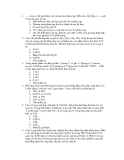
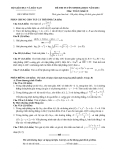
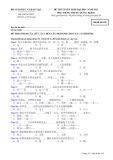
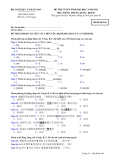
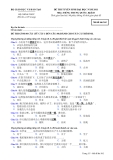
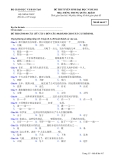
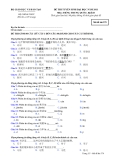
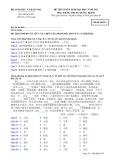
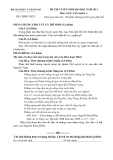
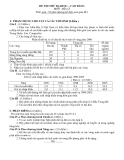
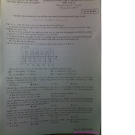
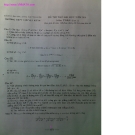
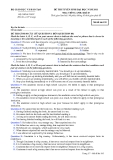
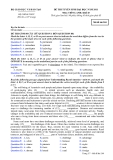
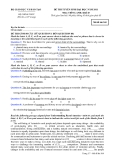
![Đề ôn thi trắc nghiệm đại học môn tiếng Anh 2012_4: [Hướng dẫn/ Kinh nghiệm/ Tài liệu]](https://cdn.tailieu.vn/images/document/thumbnail/2012/20120306/yahoo_1669/135x160/deanhdct_dh_k11_m473_9873.jpg)
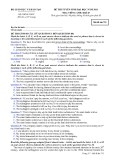
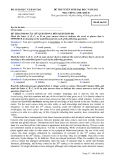
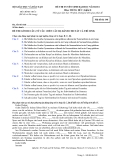
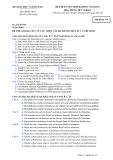



![Bài tập so sánh hơn và so sánh nhất của tính từ [kèm đáp án/mới nhất]](https://cdn.tailieu.vn/images/document/thumbnail/2025/20250808/nhatlinhluong27@gmail.com/135x160/77671754900604.jpg)
![Tài liệu tham khảo Tiếng Anh lớp 8 [mới nhất/hay nhất/chuẩn nhất]](https://cdn.tailieu.vn/images/document/thumbnail/2025/20250806/anhvan.knndl.htc@gmail.com/135x160/54311754535084.jpg)




![Tài liệu Lý thuyết và Bài tập Tiếng Anh lớp 6 [Mới nhất]](https://cdn.tailieu.vn/images/document/thumbnail/2025/20250802/hoihoangdang@gmail.com/135x160/18041754292798.jpg)





